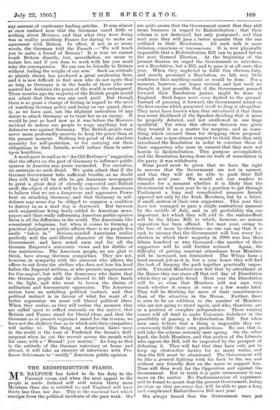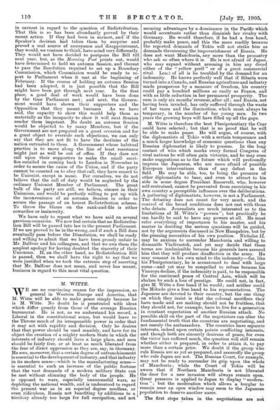M R. BALFOUR has failed to do his duty to the
Unionist cause, and when the next appeal to the people is • made Ireland will still retain thirty . more Members than she is untitled to, and England will have thirty less than her due. This is the essential fact which emerges from. the political incidents of the past week. We
are quite aware that the Government assert that they still
mean business in regard to Redistribution; their scheme is not destroyed, but only postponed ; and that next year they will pass a better measure than the one outlined in their Resolution. All such talk is mere delusion, conscious or unconscious. It is now physically impossible that a Redistribution Bill can be passed before the next General Election. At the beginning of the present Session we urged the Government to introduce, not a Resolution, but a Bill, and to pass it at all costs this year. When they neglected to fulfil this obvious duty, ands merely promised a Resolution, we felt very little confidence that anything could or would be done. For a moment, however, our hopes revived, and last week we thought it just possible that if the Government pressed forward their Resolution justice might be done to England. Such hopes were soon dashed to the ground. Instead of pressing it forward, the Government seized on the first excuse which presented itself to drop it altogether. They must have known when they introduced it that there was every likelihood of the Speaker deciding that it must be properly debated, and not swallowed in one huge mouthful. Yet when this obvious decision was given they treated it as a matter for surprise, and as some- thing which excused them for dropping their proposal. Indeed, one is now almost tempted to think that they only introduced the Resolution in order to convince those of their supporters who were in earnest that they were not hostile to Redistribution. This purpose accomplished, and the Resolution having done its work of consolation in the party, it was withdrawn.
Some proof must be given that we hive the right to assume that the Government are not in earnest, and that they will not be able to push their Bill through next year. We would ask our readers • to consider for a moment whether it is likely that the Government will next year be in a position to get through Parliament a long and complicated measure fiercely opposed not only by the Irish Members, but by a bitter, if small, section of their own supporters. This year they have not managed to pass a single contentious measure by the middle of July, and in all probability the one important Act which they will add to the statutelook will be the Aliens Bill, to which, however, no serious opposition has been offered. Yet next year, owing to the loss of more by-elections—no one can say that it is rash to assume that the Government will lose every by- election in which their majority in 1900 was less than fifteen hundred or two thousand—the number of their supporters will be still further reduced. Again, the difficulty of getting constant attendance from Members will be increased, not diminished. The Whips have a. hard enough job as it is, but a year hence they will find the task of keeping the pack together practically impos- sible. Unionist Members now feel that by attendance at the House they can stave off that evil day of Dissolution which they so greatly dread. Next year the Dissolution will be so close that Members will not care very much whether it comes at once or a few weeks later. They will be thinking far more of their constituencies than of the situation in the House. Further, there is sure to be an addition to the number of Members who are not going to stand again, and who, therefore, are in a position of complete independence. These varying causes will all tend to make Unionists disbelieve in the possibility of passing a Redistribution Bill. But when men once believe that a thing is impossible they un- consciously fulfil their own predictions. No one, that is, will take the scheme seriously next spring. On the other hand, the Irish Members, and that section of the Liberals who oppose the Bill, will be inspirited by the prospect of defeating it. They will feel that they have only got to keep up obstructive tactics for so many weeks, and then the Bill must be abandoned. The Government will be like a general fighting with his back to the sea and without any friendly fleet on the water to support him. Time will thus work for the Opposition and against the Government. But in truth it is quite unnecessary to say more on the matter. No Parliamentarian of experience will be found to assert that the present Government, losing .prestige as they are every day, will be able to pass along and complicated Redistribution Bill next year.
We always feared that the Government we pot
in earnest in regard to the question of Redistribution. That this is so has been abundantly proved by their recent action. If they had been in earnest, and if the Speaker's decision had taken them by surprise and proved a real source of annoyance and disappointment, they would, we venture to think, have acted very differently. They would not have decided to postpone the Bill till next year, but, as the Morning Post points out, would have determined to hold an autumn Session, and thereat to pass the Resolution required to set up a Boundary Commission, which Commission would be ready to re- port to Parliament when it met at the beginning of February. If the course of holding an autumn Session had been adopted, it is just possible that the Bill might have been got through next year. In the first place, a good deal of work would have been done by the time Parliament met ; and next, the Govern- ment would have shown their supporters and the Opposition that they meant business. As we have said, the capacity to show this would help them as materially as the incapacity to show it will next Session render them impotent. No doubt an autumn Session would be objected to by many Members, but if the Government are not prepared on a great occasion and for a great object to overrule such objections, we can only say that they are not fit to have the destinies of the nation entrusted to them. A Government whose habitual practice is to move along the line of least resistance might just as well be out of office. If they dare not call upon their supporters to make the small sacri- fice entailed in coming back to London in November in order to secure the cause of the Union, and if the party cannot be counted on to obey that call, they have ceased to be Unionist, except in name. For ourselves, we do not believe that the call of duty would be neglected by the ordinary Unionist Member of Parliament. The great bulk of the party are still, we believe, sincere in their Unionism, and would be perfectly willing to put up with the inconvenience of an autumn Session iu order to secure the passage of an honest Redistribution scheme. To throw the blame on the rank-and-file is either cowardice or insincerity.
We have only to repeat what we have said on several previous occasions. We now feel certain that no Redistribu- tion Bill will be passed into law in the present Parliament. If we are proved to be in the wrong, and if such a Bill does eventually pass before the Dissolution, we shall be ready and willing to admit that we have been grossly unfair to Mr. Balfour and his colleagues, and that we owe them the amplest apology for having doubted the sincerity of their Unionism. If, on the other hand, no Redistribution Bill is passed, then we shall have the right to say that we were justified when we took the extreme step of asserting that Mr. Balfour does not mean, and never has meant, business in regard to this most vital question.



































 Previous page
Previous page